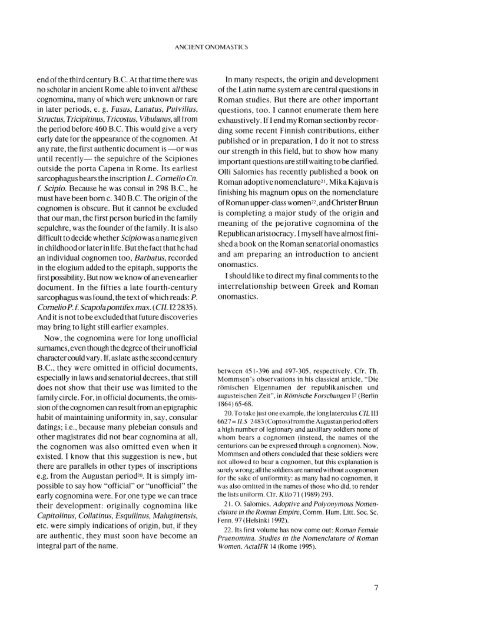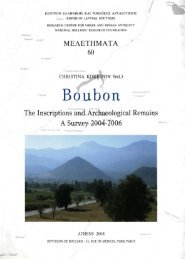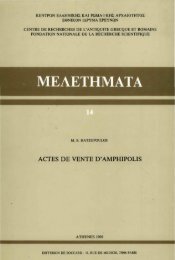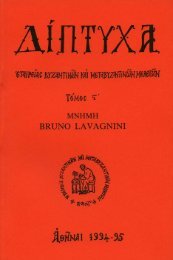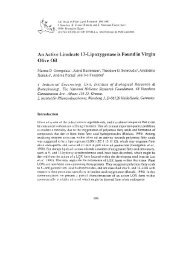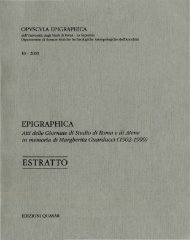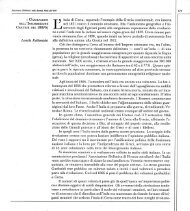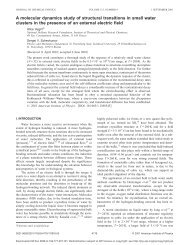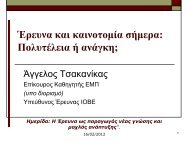Roman onomastics in the Greek East: social and political aspects ...
Roman onomastics in the Greek East: social and political aspects ...
Roman onomastics in the Greek East: social and political aspects ...
You also want an ePaper? Increase the reach of your titles
YUMPU automatically turns print PDFs into web optimized ePapers that Google loves.
ANCIENT ONOMASTICS<br />
end of <strong>the</strong> third century B.C. At that time <strong>the</strong>re was In many respects, <strong>the</strong> orig<strong>in</strong> <strong>and</strong> development<br />
no scholar <strong>in</strong> ancient Rome able to <strong>in</strong>vent all <strong>the</strong>se of <strong>the</strong> Lat<strong>in</strong> name system are central questions <strong>in</strong><br />
cognom<strong>in</strong>a, many of which were unknown or rare <strong>Roman</strong> studies. But <strong>the</strong>re are o<strong>the</strong>r important<br />
<strong>in</strong> later periods, e. g. Fusus, Lanatus, Pulvillus, questions, too. I cannot enumerate <strong>the</strong>m here<br />
Structus, Tricipit<strong>in</strong>us, Tricostus, Vibulanus, all from exhaustively. If I end my <strong>Roman</strong> section by recor<br />
<strong>the</strong> period before 460 B.C. This would give a very<br />
early date for <strong>the</strong> appearance of <strong>the</strong> cognomen. At<br />
any rate, <strong>the</strong> first au<strong>the</strong>ntic document is —or was<br />
until recently— <strong>the</strong> sepulchre of <strong>the</strong> Scipiones<br />
outside <strong>the</strong> porta Capena <strong>in</strong> Rome. Its earliest<br />
sarcophagus bears <strong>the</strong> <strong>in</strong>scription L. Cornelio Cn.<br />
f. Scipio. Because he was consul <strong>in</strong> 298 B.C., he<br />
must have been born c. 340 B.C. The orig<strong>in</strong> of <strong>the</strong><br />
cognomen is obscure. But it cannot be excluded<br />
that our man, <strong>the</strong> first person buried <strong>in</strong> <strong>the</strong> family<br />
sepulchre, was <strong>the</strong> founder of <strong>the</strong> family. It is also<br />
difficult to decide whe<strong>the</strong>r Scipio was a name given<br />
<strong>in</strong> childhood or later <strong>in</strong> life. But <strong>the</strong> fact that he had<br />
an <strong>in</strong>dividual cognomen too, Barbatus, recorded<br />
<strong>in</strong> <strong>the</strong> elogium added to <strong>the</strong> epitaph, supports <strong>the</strong><br />
first possibility. But now we know of an even earlier<br />
document. In <strong>the</strong> fifties a late fourth-century<br />
sarcophagus was found, <strong>the</strong> text of which reads: P.<br />
CornelioP. f. Scapola pontifex max. (CIL 12 2835).<br />
And it is not to be excluded that future discoveries<br />
may br<strong>in</strong>g to light still earlier examples.<br />
Now, <strong>the</strong> cognom<strong>in</strong>a were for long unofficial<br />
surnames, even though <strong>the</strong> degree of <strong>the</strong>ir unofficial<br />
character could vary. If, as late as <strong>the</strong> second century<br />
B.C., <strong>the</strong>y were omitted <strong>in</strong> official documents,<br />
especially <strong>in</strong> laws <strong>and</strong> senatorial decrees, that still<br />
does not show that <strong>the</strong>ir use was limited to <strong>the</strong><br />
family circle. For, <strong>in</strong> official documents, <strong>the</strong> omission<br />
of <strong>the</strong> cognomen can result from an epigraphic<br />
habit of ma<strong>in</strong>ta<strong>in</strong><strong>in</strong>g uniformity <strong>in</strong>, say, consular<br />
dat<strong>in</strong>gs; i.e., because many plebeian consuls <strong>and</strong><br />
o<strong>the</strong>r magistrates did not bear cognom<strong>in</strong>a at all,<br />
<strong>the</strong> cognomen was also omitted even when it<br />
existed. I know that this suggestion is new, but<br />
<strong>the</strong>re are parallels <strong>in</strong> o<strong>the</strong>r types of <strong>in</strong>scriptions<br />
e.g. from <strong>the</strong> Augustan period 20 . It is simply impossible<br />
to say how "official" or "unofficial" <strong>the</strong><br />
early cognom<strong>in</strong>a were. For one type we can trace<br />
d<strong>in</strong>g some recent F<strong>in</strong>nish contributions, ei<strong>the</strong>r<br />
published or <strong>in</strong> preparation, I do it not to stress<br />
our strength <strong>in</strong> this field, but to show how many<br />
important questions are still wait<strong>in</strong>g to be clarified.<br />
Olli Salomies has recently published a book on<br />
<strong>Roman</strong> adoptive nomenclature 21 . Mika Kajavais<br />
f<strong>in</strong>ish<strong>in</strong>g his magnum opus on <strong>the</strong> nomenclature<br />
of <strong>Roman</strong> upper-class women 22 , <strong>and</strong> Christer Bruun<br />
is complet<strong>in</strong>g a major study of <strong>the</strong> orig<strong>in</strong> <strong>and</strong><br />
mean<strong>in</strong>g of <strong>the</strong> pejorative cognom<strong>in</strong>a of <strong>the</strong><br />
Republican aristocracy. I myself have almost f<strong>in</strong>ished<br />
a book on <strong>the</strong> <strong>Roman</strong> senatorial <strong>onomastics</strong><br />
<strong>and</strong> am prepar<strong>in</strong>g an <strong>in</strong>troduction to ancient<br />
<strong>onomastics</strong>.<br />
I should like to direct my f<strong>in</strong>al comments to <strong>the</strong><br />
<strong>in</strong>terrelationship between <strong>Greek</strong> <strong>and</strong> <strong>Roman</strong><br />
<strong>onomastics</strong>.<br />
between 451-396 <strong>and</strong> 497-305, respectively. Cfr. Th.<br />
Mommsen's observations <strong>in</strong> his classical article, "Die<br />
römischen Eigennamen der republikanischen und<br />
augusteischen Zeit", \n Römische Forschungen I<br />
<strong>the</strong>ir development: orig<strong>in</strong>ally cognom<strong>in</strong>a like<br />
2 (Berl<strong>in</strong><br />
1864)65-68.<br />
20. To take just one example, <strong>the</strong> long laterculus CIL III<br />
6627 = ILS 2483 (Coptos) from <strong>the</strong> Augustan period offers<br />
a high number of legionary <strong>and</strong> auxiliary soldiers none of<br />
whom bears a cognomen (<strong>in</strong>stead, <strong>the</strong> names of <strong>the</strong><br />
centurions can be expressed through a cognomen). Now,<br />
Mommsen <strong>and</strong> o<strong>the</strong>rs concluded that <strong>the</strong>se soldiers were<br />
not allowed to bear a cognomen, but this explanation is<br />
surely wrong; all <strong>the</strong> soldiers are named without a cognomen<br />
for <strong>the</strong> sake of uniformity: as many had no cognomen, it<br />
was also omitted <strong>in</strong> <strong>the</strong> names of those who did, to render<br />
<strong>the</strong> lists uniform. Cfr. Klio 71(1989) 293.<br />
21. O. Salomies, Adoptive <strong>and</strong> Polyonymous Nomenclature<br />
<strong>in</strong> <strong>the</strong> <strong>Roman</strong> Empire, Comm. Hum. Litt. Soc. Sc.<br />
Capitol<strong>in</strong>us, Collat<strong>in</strong>us, Esquil<strong>in</strong>us, Malug<strong>in</strong>ensis,<br />
Fenn. 97 (Hels<strong>in</strong>ki 1992).<br />
etc. were simply <strong>in</strong>dications of orig<strong>in</strong>, but, if <strong>the</strong>y<br />
22. Its first volume has now come out: <strong>Roman</strong> Female<br />
are au<strong>the</strong>ntic, <strong>the</strong>y must soon have become an Praenom<strong>in</strong>a. Studies <strong>in</strong> <strong>the</strong> Nomenclature of <strong>Roman</strong><br />
<strong>in</strong>tegral part of <strong>the</strong> name. Women, ActalFR 14 (Rome 1995).<br />
7


